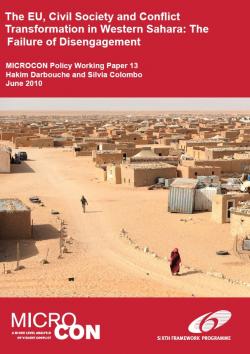The EU, Civil Society and Conflict Transformation in Western Sahara: The Failure of Disengagement
The protracted Western Sahara dispute, which has for over three decades pitted Morocco against the Sahrawi independentistas of the Polisario Front, epitomises the impotence of state-led conflict resolution efforts. The European Union (EU) has voluntarily remained withdrawn from the processes of transformation of this southern neighbourhood conflict, unable to surpass the politics of its inherent inter-governmentalism. This paper examines the alternative role played by local civil society organisations (CSO) in the transformation of the Western Sahara conflict. It analyses the input of a methodologically-informed selection of Moroccan and Sahrawi CSOs with a view to identifying the potential of more effectual EU involvement in the dispute, notably through cooperation with the relevant CSOs. The findings of this study point to the overwhelmingly fuelling role played by local CSOs in this particular conflict, but identify ways in which more peace-building civil actors could be empowered by the EU. These CSOs are often of grass-root origins with little or no links to the establishments on both sides of the conflict.
Paper produced in the context of the MICROCON project (Work Package 11, "Conflict in the European Neighbourhood"), funded by the EU's Seventh Framework Research Programme. Subsequent version published in Nathalie Tocci (ed.), The European Union, Civil Society and Conflict, London and New York, Routledge, 2011, p. 126-146 (Routledge/UACES contemporary European studies ; 19).
-
Details
Brighton, Institute of Development Studies at the University of Sussex, June 2010, 30 p. (MICROCON Policy Working Paper ; 13) -
ISBN/ISSN/DOI:
978-1-85864-932-3
1. Introduction
2. The EU and Western Sahara: the Politics of Disengagement
2.1 Quid regional frameworks?
3. Local CSOs and the Western Sahara Conflict: Activities, Impact and Effectiveness
3.1 The activities of CSOs
3.2 The impact of CSOs
3.3 The effectiveness of CSOs
4. The Role and Impact of the EU
4.1 Testing the three hypotheses: the liberal peace paradigm, the disembedded civil society critique and the Gramscian critique
5. Conclusion
References
Appendix 1: Map of Western Sahara
Appendix 2: List of interviews with Sahrawi and Moroccan CSOs
Topic
Tag
Related content
-
Publication12/02/2015
The European Union, Civil Society and Conflict
leggi tutto -
Ricerca27/01/2014
MICROCON - Conflicts in the European Neighbourhood
leggi tutto



